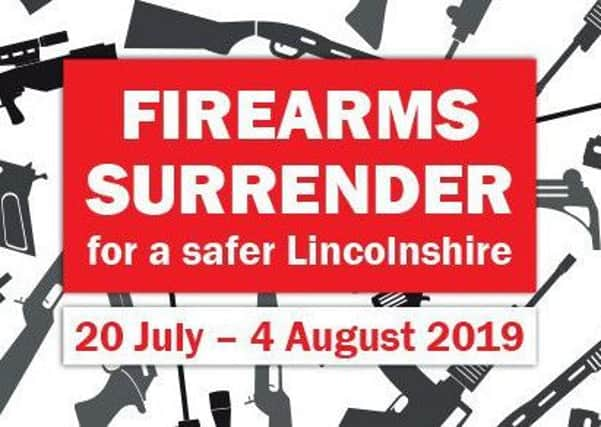Lincolnshire Police inviting people to hand in unwanted and unlicensed firearms and weapons


Residents can surrender their unlicensed or unwanted firearms, ammunition, war memorabilia and imitation weapons between July 20 and August 4.
The surrender period will serve as a reminder and an opportunity for people to relieve their homes and their consciences of unlicensed and unwanted weapons.
Advertisement
Hide AdAdvertisement
Hide AdDetective Inspector Mark Seage said: “This is a chance for people to really think about whether they want to hold on to their weapons, and as a reminder to check that they still have the legal right to do so.
“One less firearm means one less opportunity for it to fall into the wrong hands.
“While crimes involving firearms in Lincolnshire are extremely rare, we understand that every weapon poses a potential threat if not licensed and stored safely. That’s why we’re offering people this opportunity to safely dispose of any unwanted weapons.”
The last firearms surrender in 2017 proved successful with 142 firearms handed in - none linked to previous crimes.
Advertisement
Hide AdAdvertisement
Hide AdThe surrender will also invite imitation and replica weapons to be handed in.
Detective Inspector Mark Seage explained: “The fear and intimidation they cause is real even if they are not. Anything that looks like a firearm will be accepted as part of the surrender week.”
During the surrender period, those surrendering firearms will not face prosecution for illegal possession of a firearm at the point of surrender of the firearm to the police, and they can remain anonymous.
However, this surrender does not mean police will not investigate firearms offences, should any come to light, once the operation has concluded.
This is a firearms surrender and not a firearms amnesty.
Advertisement
Hide AdAdvertisement
Hide AdYou should contact police immediately if you know that someone else has a firearm illegally or are concerned about someone in possession of any firearm, even if they have a licence.
In an emergency dial 999, and if you do not want to give your name you can ring Crimestoppers on 0800 555 111.
You can take your item to Boston, Skegness, Lincoln and Grantham Police Stations providing it is packaged and bagged safely and appropriately. Check the website for opening times here https://www.lincs.police.uk/contact/police-stations/
There is no need to call ahead unless you have queries or concerns about your weapon or the process of handing it in.
Advertisement
Hide AdAdvertisement
Hide AdIf you are elderly, infirm or without transport, police will attend your home. Call 101.
Do not attempt to bring items that might be unstable, e.g. a hand grenade. Call 101 for advice.
The national two week event invites all forces to take part and reduce the volume of guns in circulation in the UK which could get into the wrong hands.
During the national firearms surrender in 2014 more than 6,000 firearms and thousands of rounds of ammunition were recovered by police forces across the UK. In 2017, the total figure for firearms and ammunition combined was around 9,500. Any reduction in the volume of illegally held firearms in the UK reduces the opportunity for these weapons to fall into the wrong hands, explains the force.
Advertisement
Hide AdAdvertisement
Hide AdIn previous surrender campaigns there have been various weapons handed in including antique guns, air weapons, rifles and shotguns.
A firearms amnesty may be considered by some to represent immunity from prosecution for the lifetime of the firearm, this is not the case a with firearm surrender; with a surrender any criminal use of that firearm will be examined and acted upon.
Any amnesty applies only at the point of surrender, not for any offences committed prior to the surrender.
A proportion of the firearms will be destroyed but some may be retained by museums if they are of significant interest or unusual. Any guns which can be proved to be linked to a crime will be kept as evidence and retained for any future proceedings.